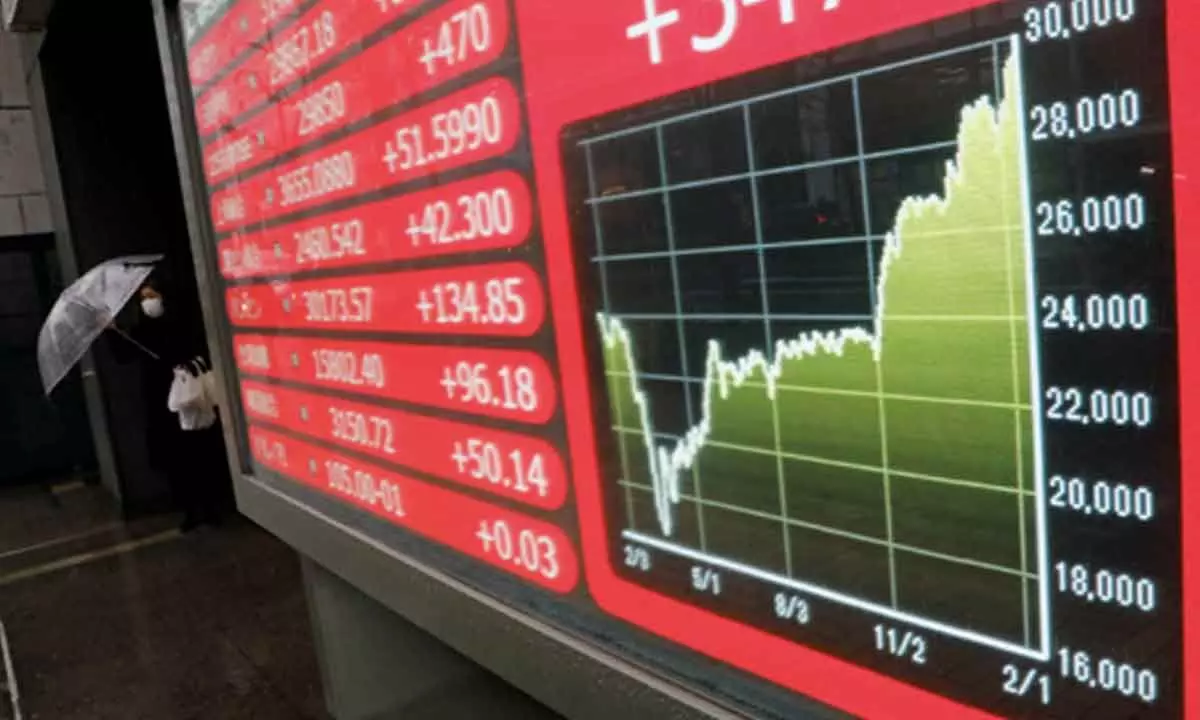Asian stocks track gains on Wall St
US markets moved up for 3rd straight week; Seoul, Shanghai and Hong Kong settled in the green, while Tokyo ended lower; European markets were trading on a mixed note
image for illustrative purpose

Market Watch
• Nikkei-225 hit 33-yr high and contracts
• 10-yr Treasury rose to 4.47% from 4.44%
• Just a few weeks ago, it was above 5%, highest level since 2007
• Retailers made strong gains in Sept qtr
Hong Kong: World shares were mixed on Monday after Wall Street closed its third straight winning week with a tiny gain. In share trading, Germany’s DAX fell 0.1 per cent to 15,907.92 and the CAC 40 in Paris gained 0.3 per cent to 7,256.93. Britain’s FTSE 100 was down 0.3 per cent at 7,481.86. The future for the S&P-500 and the Dow Jones Industrial Average were virtually changed. Japan’s Nikkei-225 index broke its September peak, hitting a 33-year high, and then fell to 33,388.03, shedding 0.6 per cent.
The Hang Seng in Hong Kong added 1.6 per cent to 17,732.36 points, and the Shanghai Composite index advanced 0.5 per cent to 3,068.32 points. China announced on Monday that it would keep its benchmark lending rates unchanged as expected due to a weaker yuan and the need to assess the impact of recent stimulus measures on the economy.
In South Korea, the Kospi was 0.9 per cent higher, at 2,491.20. Australia’s S&P/ASX 200 edged 0.1 per cent higher to 7,058.40. Taiwan’s Taiex was little changed. The SET in Bangkok dropped 0.1 per cent as the state planning agency announced Monday that Thailand’s economy grew slower than expected in the last quarter due to weakness in exports and agriculture, despite strong consumer spending and a recovery in tourism.
On Friday, the S&P 500 edged up 0.1 per cent to 4,514.02 and is near its highest level in three months. The Dow Jones Industrial Average inched up less than 0.1 per cent to 34,947.28 and the Nasdaq composite gained 0.1 per cent to 14,125.48.
Markets hope inflation has cooled enough for the Federal Reserve to finally stop its market-crunching hikes to interest rates. The Fed has already raised its main interest rate to the highest level since 2001, trying to slow the economy and dent financial markets just enough to get inflation under control without causing a painful recession.
Now, traders are trying to bet on when the Fed could actually begin cutting interest rates, something that can juice prices for investments and provide oxygen for the financial system. The Fed has said that it plans to keep rates high for a while to ensure that the battle against inflation is definitively won, but traders are thinking cuts could begin early in the summer of 2024.

